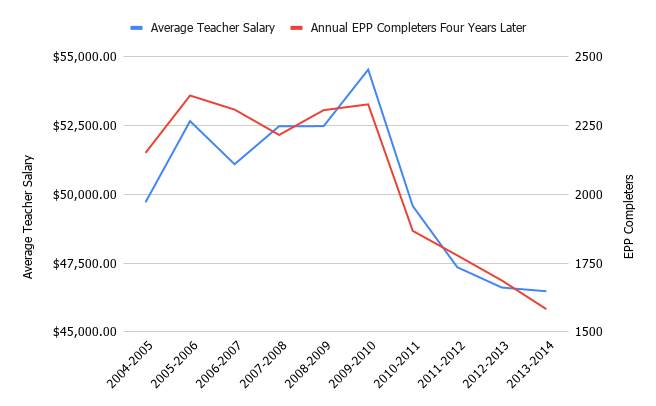With the passage of HB 852, Mississippi public school teachers are poised to receive a much-anticipated raise for the 2021-2022 school year. If signed by the Governor, HB 852 will adjust the minimum salary schedule for certified teachers to provide a raise of $1,110 for those in their first three years of teaching (bringing the starting salary to $37,000, up from $35,890) and $1,000 for all others, including assistant teachers.
What will this mean for Mississippi teachers?
The increase in monthly paychecks will vary somewhat by career length and tax filing status, but we estimate that the average teacher as well as those in their first three years of teaching will see the following bumps in annual, monthly, and daily pay:
Beginner Teacher
| Annual Salary | Annual Take-Home Pay | Monthly Take-Home Pay | Daily Take-Home Pay | |
| 2020-2021 (before HB 852) | $35,890.00 | $26,838.23 | $2,236.52 | $73.53 |
| 2021-2022 (after HB 852) | $37,000.00 | $27,599.35 | $2,299.95 | $75.61 |
| Raise | $1,110.00 | $761.11 | $63.43 | $2.09 |
Average Teacher
| Annual Salary | Annual Take-Home Pay | Monthly Take-Home Pay | Daily Take-Home Pay | |
| 2020-2021 (before HB 852) | $46,862.00 | $34,361.57 | $2,863.46 | $94.14 |
| 2021-2022 (after HB 852) | $47,862.00 | $35,047.26 | $2,920.60 | $96.02 |
| Raise | $1,000.00 | $685.69 | $57.14 | $1.88 |
Mississippi teachers will surely appreciate any increase in compensation, both as extra money in their pocket and implicit recognition of their hard work and sacrifice. But upon receiving their first paycheck for the 2021-2022 school year, these same teachers may also find themselves feeling somewhat disheartened if, after two years of campaign promises and intense legislative negotiations, an extra $2 a day is all they have to show for it. After all, with the average Mississippi teacher salary having lost almost $10,000 in inflation-adjusted value over ten years, a raise of this magnitude does little more than keep teacher salaries at pace with inflation—a welcome development, but one with admittedly limited impact.
Existing teachers aren’t the only ones paying close attention. In the midst of an ongoing critical teacher shortage in Mississippi, the impact of compensation on recruitment of prospective teachers should not be underestimated: in recent years the rate of educator preparation program (EPP) graduates in Mississippi—the primary source of new teachers—has tracked downwards with the inflation-adjusted value of the average teacher salary with almost pinpoint precision, suggesting (unsurprisingly) that compensation plays a key role in the decision to become a teacher in Mississippi.
Inflation-Adjusted Average Teacher Salary and Annual EPP Completers Four Years Later, 2004-2005 to 2013-2014 (March 2020 dollars)

Will HB 852 spur a much-needed increase in recruits to the teaching profession in Mississippi?
With the $1,000 raise essentially restoring the average salary to its value in the early 2010s, we believe the impact of HB 852 will be limited beyond providing existing teachers with an extra $60 a month in discretionary income. In short, we don’t think HB 852 alone will be the spark needed to revive the state’s educator pipeline.
Thankfully, though, there are additional actions the legislature can take to address this pressing issue, even in the remaining weeks of the current legislative session.
Closely intertwined with compensation is the cost of earning a teaching degree in the first place, as monthly student loan payments eat into the take-home pay of many teachers. To address this issue, the legislature appears close to passing HB 1179, which would set up a loan repayment assistance program for Mississippi teachers in their first three years of teaching. Dubbed the William F. Winter and Jack Reed, Sr., Teacher Loan Repayment Program, this initiative would provide beginner teachers up to $10,500 (with teachers in critical shortage areas eligible for up to $16,500) over three years to pay off student loan debt (final figures are likely to be approved in conference). While our research suggests that financial aid for teachers will be more effective if disbursed during their undergraduate years, we applaud the legislature for their focus on offsetting the rising cost of college for teachers and hope to see this bill signed into law in the coming weeks.
There are no other compensation or financial aid bills currently alive in the legislature, but upon passage of HB 852 on March 18, House Education Chair Richard Bennett suggested the possibility of further action when addressing the House floor:
“We’re trying to do something for incentives for teachers, so it is a possibility that we will come back to you and ask for unanimous consent to suspend the rules, but, again, we’re trying to weigh the balance of what the taxpayer can handle and what we can do for the teachers, so we may be coming back to you before this session is over to ask you for suspension to do a little more, a little something here… Hopefully we can come back with a little more of an incentive-type package.”
House Education Chair Richard Bennett from the House Floor on March 18, 2021.
It is unclear exactly what Chair Bennett has in mind, but any additional incentives would be a positive development for existing teachers as well as a potential recruitment tool for attracting aspiring teachers into the profession. Particularly with Mississippi about to receive $1,777,302,931 in state aid under the American Rescue Plan Act, it would now be much more feasible to implement incentives such as a stipend for teachers in critical shortage areas (one of the primary recommendations in our report, Nothing in the Pipes: Educator Crisis in Mississippi) or even bump the teacher pay raise for 2021-2022 by another $1-2K. Chair Bennett’s comments suggest there may be the political will to achieve at least one of these goals.
In Conclusion
As the 2021 legislative session comes to a close, we will be paying close attention to any action related to Mississippi teachers. The next big news will be how the budget for education emerges from conference, which will likely happen the final weekend in March. Stay tuned for updates and analysis.

